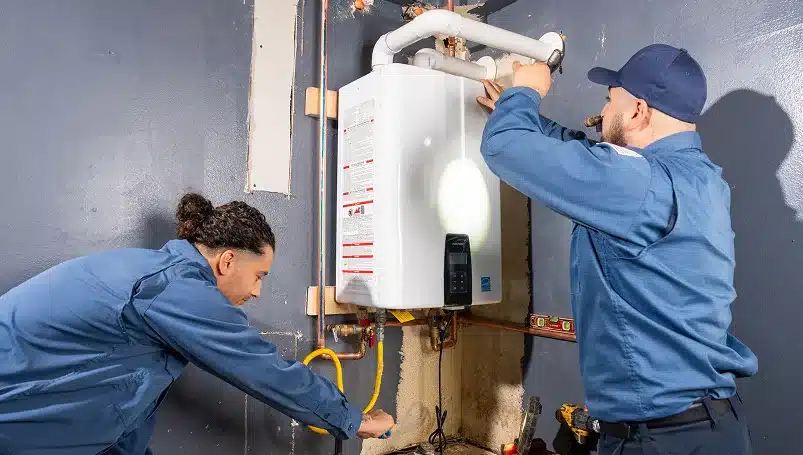Gas leaks pose a serious threat to your home and health, potentially leading to fires, explosions, or carbon monoxide poisoning.
Recognizing the signs early can prevent disaster and protect your loved ones.
At First Class Plumbing and Rooter, we’re committed to your safety with expert gas line services.
This detailed guide walks you through the critical signs of a gas leak, why they’re dangerous, and what to do if you suspect one.
Why Gas Leak Detection Matters
Natural gas is invisible and odorless in its raw form, but utility companies add a chemical called mercaptan to give it a distinctive “rotten egg” smell for safety.
While this helps, detection isn’t foolproof—older adults, people with impaired smell, or leaks in hard-to-notice areas like basements can complicate things.
Missing a gas leak can lead to:
Health Risks: Inhaling gas can cause symptoms like dizziness or nausea, and carbon monoxide (a byproduct of incomplete combustion) can be deadly.
Fire or Explosion: A single spark from a light switch or appliance can ignite leaking gas.
Unexpected Costs: Even small leaks waste gas, quietly driving up your utility bills.
Catching a leak early is your best defense.
If you’re ever in doubt, our emergency plumbing services are available 24/7 to assist.
Sensory Signs of a Gas Leak
Gas leaks often reveal themselves through your senses.
Here’s what to watch, listen, and look for:
1. The Smell of Gas
The sulfur-like, rotten egg odor is the most well-known sign.
You might notice it near gas appliances (stoves, water heaters), along pipes, or even outside near gas lines.
However, smell isn’t always reliable:
Small Leaks: Tiny leaks may not produce enough odor to detect.
Olfactory Fatigue: Prolonged exposure can dull your ability to smell it.
Impaired Sense: About 1 in 10 people struggle to detect mercaptan, especially with age.
Solution: Install a gas detector with an audible alarm, much like a smoke detector, for an extra layer of protection.
2. Unusual Sounds
Escaping gas often makes distinct noises:
Hissing: A soft, steady sound near pipes or appliances suggests a slow leak.
Whistling: Higher-pitched tones might indicate gas escaping a tight space.
Roaring: Loud, intense sounds signal a major breach, requiring immediate action.
Example: A faint hiss behind your dryer could mean a loose connection, while a roaring sound near an outdoor meter demands evacuation.
3. Visual Clues
Look for these physical indicators:
Dead Vegetation: Outdoors, leaking gas can kill grass, shrubs, or plants near buried pipelines by displacing oxygen in the soil.
Bubbling Water: Bubbles rising in puddles or wet soil near gas lines show gas escaping underground.
Dust or Debris: A sudden puff of dust from a wall, floor, or appliance might mean a pipe has ruptured.
Corrosion: Rusty or discolored spots on exposed pipes or fittings signal wear that could lead to leaks.
Condensation: Unexplained moisture on gas pipes or appliances can hint at a problem.
Flame Color: Gas flames should burn blue. A yellow or orange flame suggests improper combustion, possibly from a leak or blockage.
Physical Symptoms of Gas Exposure
Gas leaks don’t just affect your home—they affect your body.
Here are the symptoms to watch for, especially in enclosed spaces:
Headaches or Dizziness: Often the earliest warning of carbon monoxide exposure, which binds to your blood and starves your brain of oxygen.
Nausea or Vomiting: Easily confused with the flu or food poisoning, but a telltale sign if others feel it too.
Fatigue or Weakness: Feeling unusually tired or sluggish without explanation.
Shortness of Breath: Particularly concerning for those with asthma or lung conditions.
Eye or Throat Irritation: Burning sensations, watery eyes, or a scratchy throat from gas inhalation.
Danger Zone: If multiple household members experience these symptoms at once—or if pets seem lethargic—evacuate immediately. Carbon monoxide is silent and odorless, making it especially lethal.
Pro Tip: Install carbon monoxide detectors on every level of your home, especially near sleeping areas. They’re as vital as smoke alarms.
The Risks of Ignoring Gas Leak Signs
Brushing off these warnings can have catastrophic consequences:
Explosions: Gas builds up in enclosed spaces, and a spark from a phone, light switch, or even static electricity can trigger a blast.
Fires: Leaks near open flames (like a pilot light) or hot surfaces can ignite instantly.
Chronic Health Issues: Low-level exposure over time can damage your nervous system or organs.
Structural Damage: Leaking gas corrodes pipes and fittings, leading to expensive repairs down the line.
The National Fire Protection Association (NFPA) reports that gas leaks contribute to hundreds of residential fires each year.
Acting fast isn’t just smart—it’s essential.
What to Do If You Suspect a Gas Leak
If you spot any of these signs, follow these steps immediately:
Evacuate Everyone: Get all people and pets out of the building without delay.
Avoid Ignition Sources: Don’t flip switches, use your phone, or light matches—anything that could spark.
Turn Off the Gas (If Safe): If you can reach the main shut-off valve (usually near the meter) without risk, turn it to the “off” position.
Call for Help: From a safe distance, call 911 or your gas utility’s emergency line. Then, reach out to our gas line repair team.
Stay Out: Don’t re-enter until a professional confirms the area is safe.
Warning: Never attempt to find or fix the leak yourself. Our technicians use specialized tools like electronic gas detectors and pressure tests to pinpoint and resolve issues safely.
For more emergency advice, read How to Handle Emergency Plumbing Situations in Riverside, CA.
Proactive Prevention Tips
Stay ahead of gas leaks with these practical steps:
Regular Inspections: Schedule annual checkups with our gas line inspection services to catch problems early.
Appliance Maintenance: Keep gas-powered devices like furnaces and water heaters in top shape. Explore our furnace tune-up and water heater repair options.
Detectors: Invest in gas and carbon monoxide alarms for round-the-clock monitoring.
Safe DIY Practices: Before digging in your yard, call 811 to locate underground gas lines and avoid accidental damage.
Our plumbing service plan offers routine maintenance and priority service for added peace of mind.
Why Trust First Class Plumbing and Rooter?
Gas leaks demand expertise, and Riverside homeowners choose us because:
Certified Pros: Our technicians are licensed and trained in gas safety standards.
Cutting-Edge Tools: We use gas detectors, infrared cameras, and more for accurate diagnosis.
Round-the-Clock Service: Our emergency plumbing team is available 24/7.
Clear Pricing: No surprises—just honest, upfront costs.
Learn more about our gas line services or dive into customer experiences on our blog.
Act Now: Safeguard Your Home
Gas leaks are a hidden risk, but knowing the signs empowers you to protect your family.
If you notice any unusual smells, sounds, sights, or symptoms, don’t wait—take action.
For expert help or a preventive inspection, contact First Class Plumbing and Rooter.
Click request appointment or call (855) 665-0779 today.
For more home safety insights, visit our blog.


